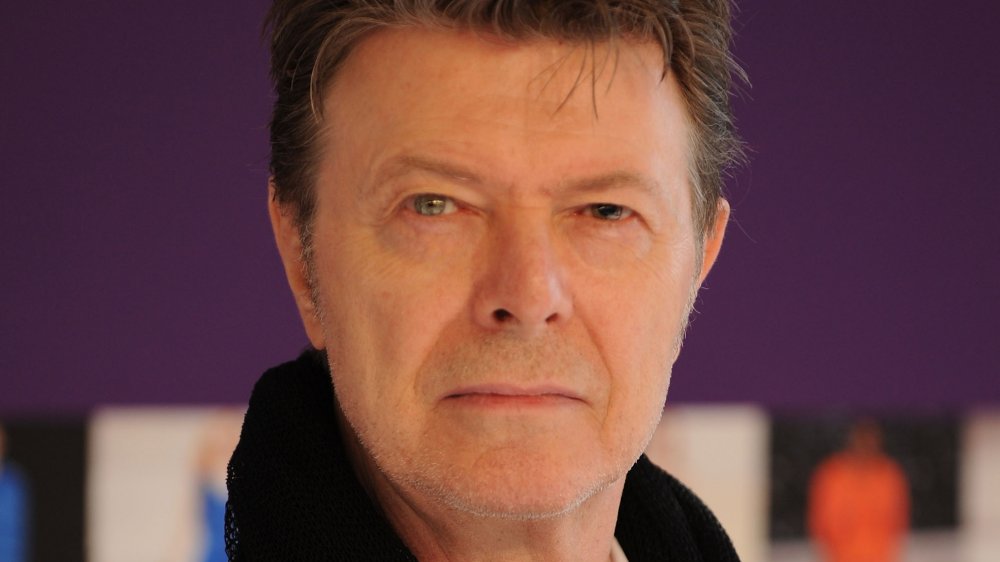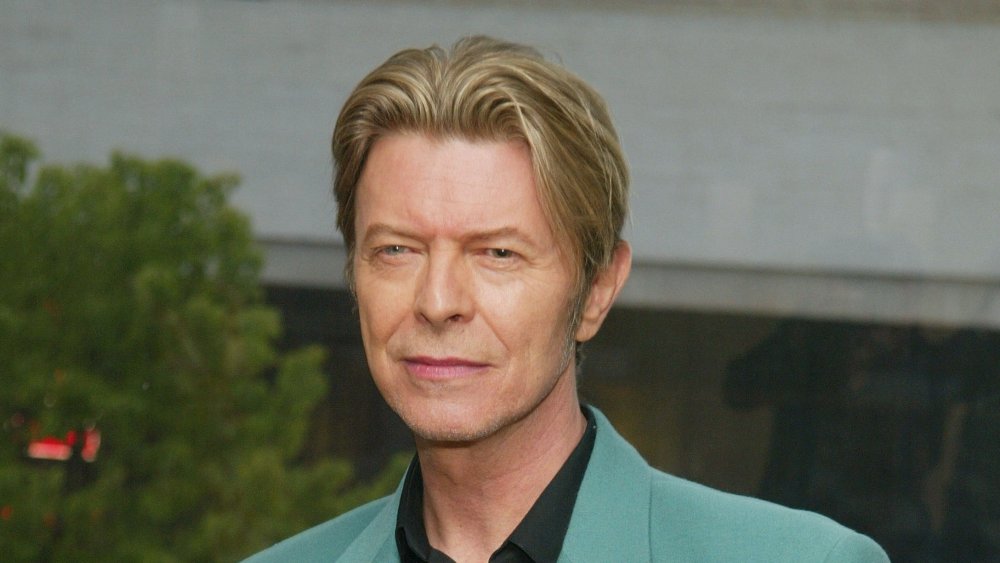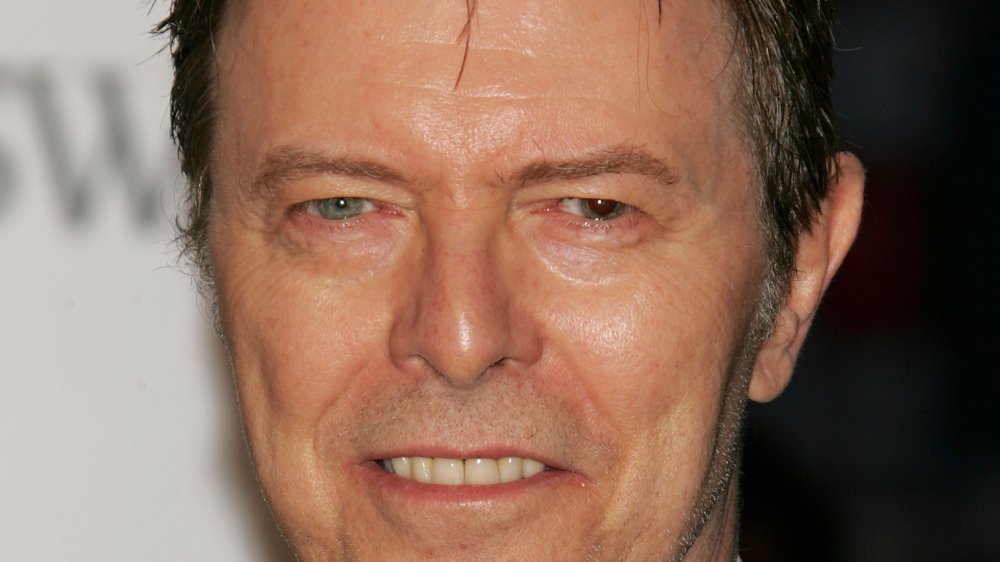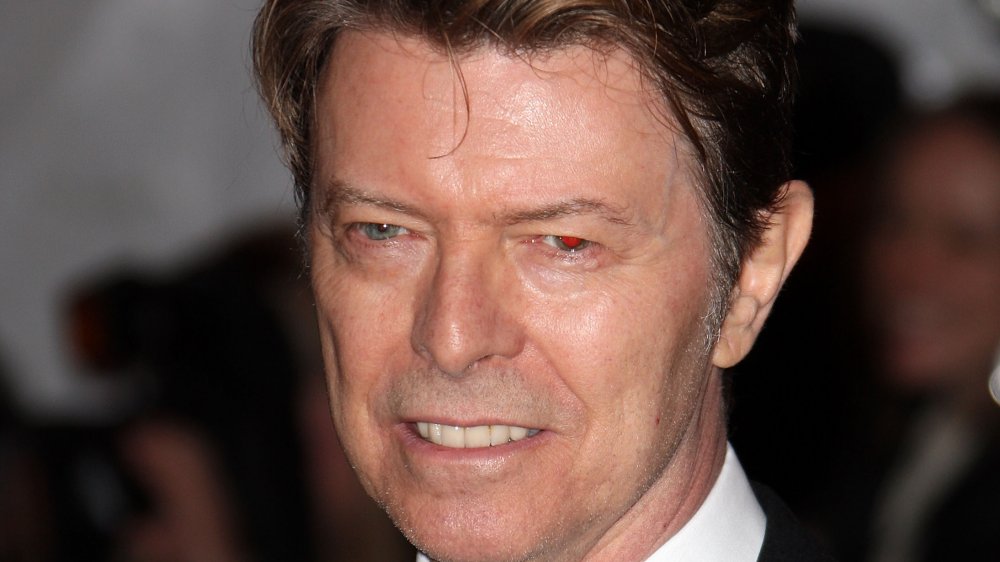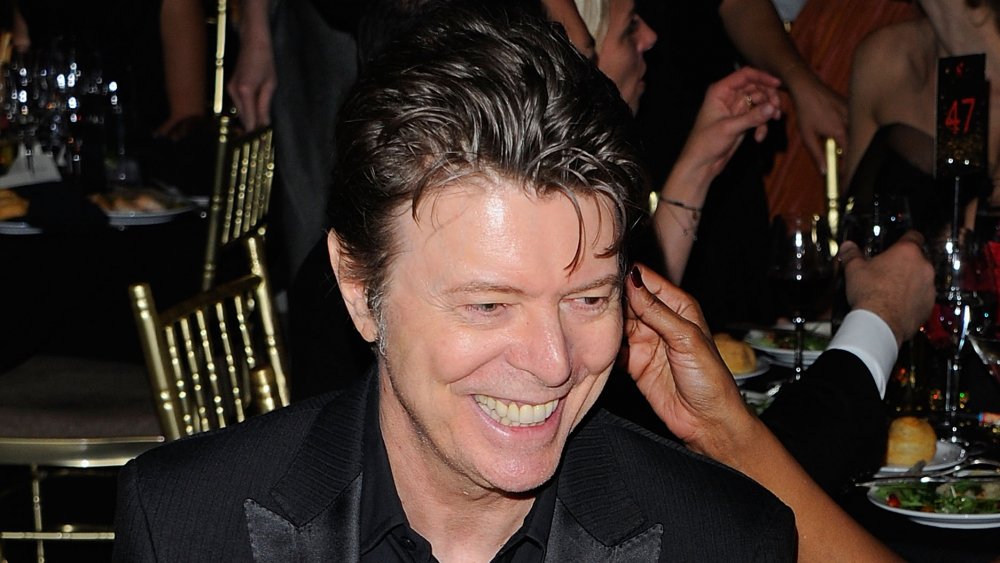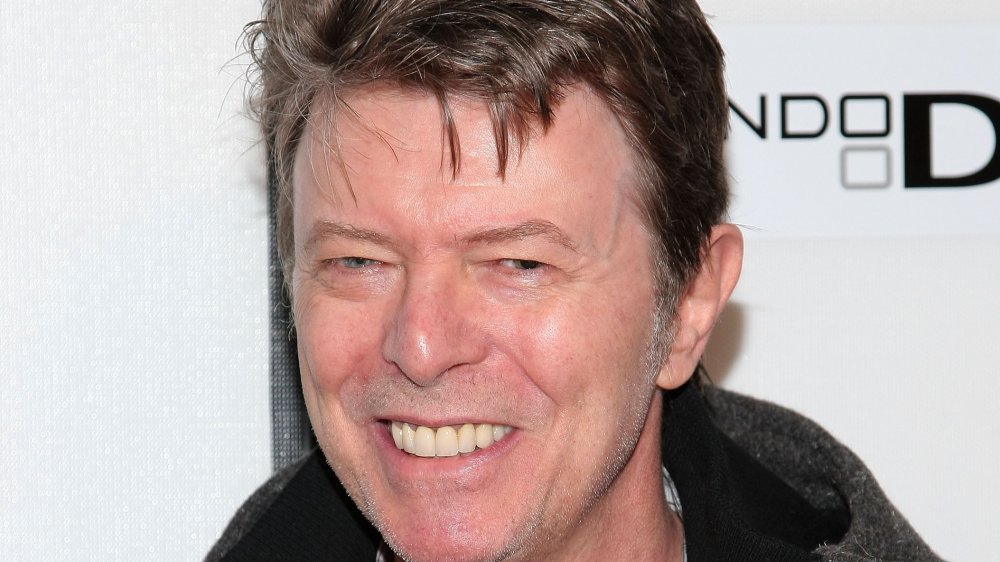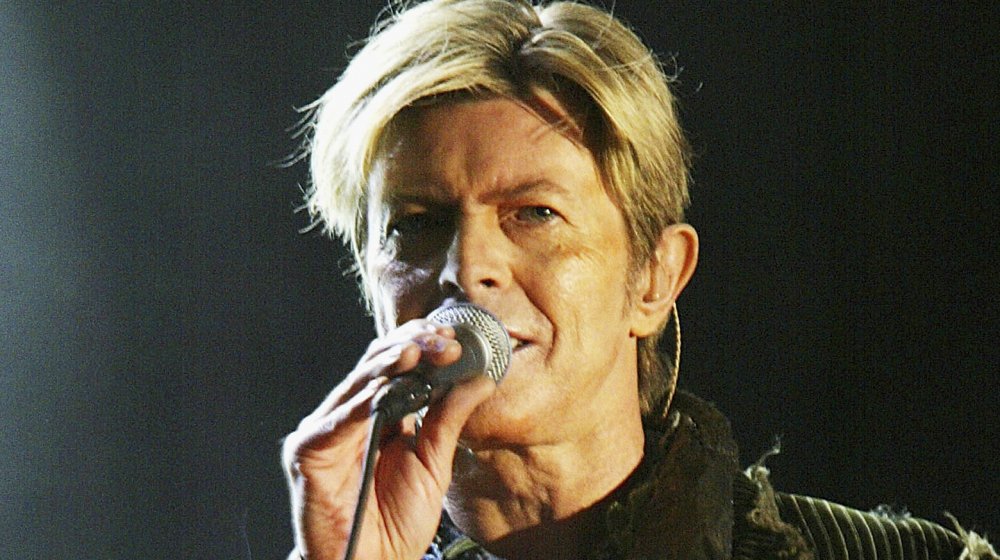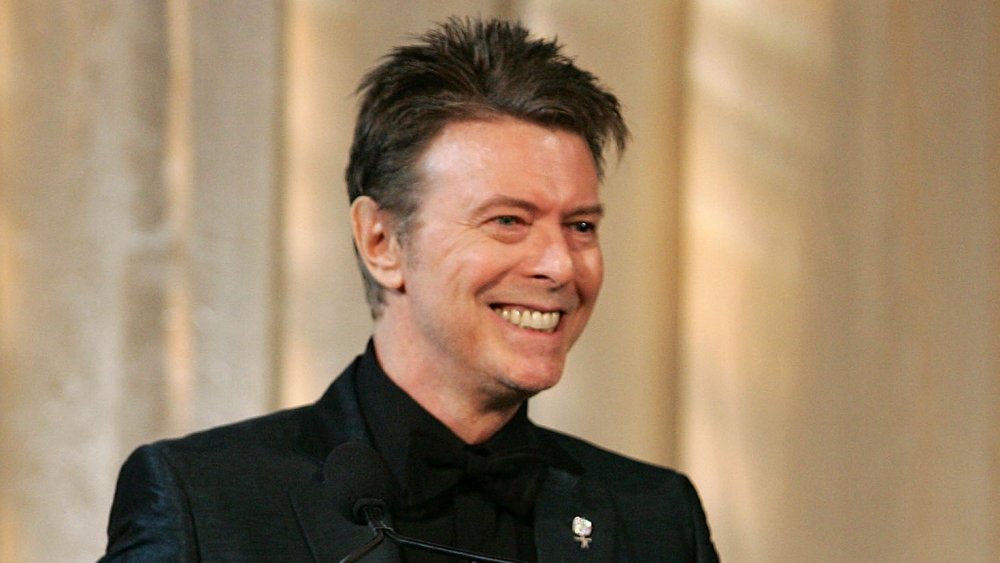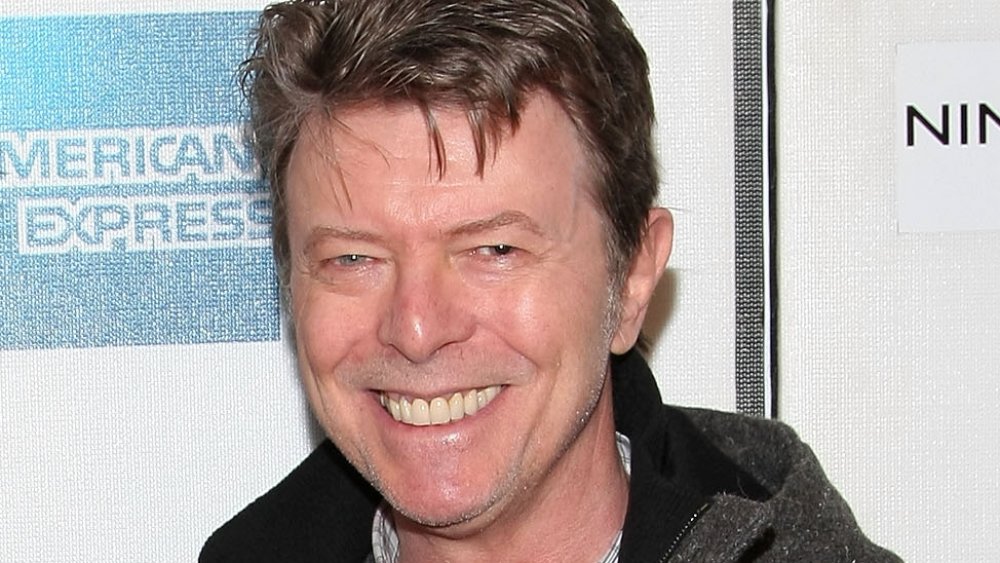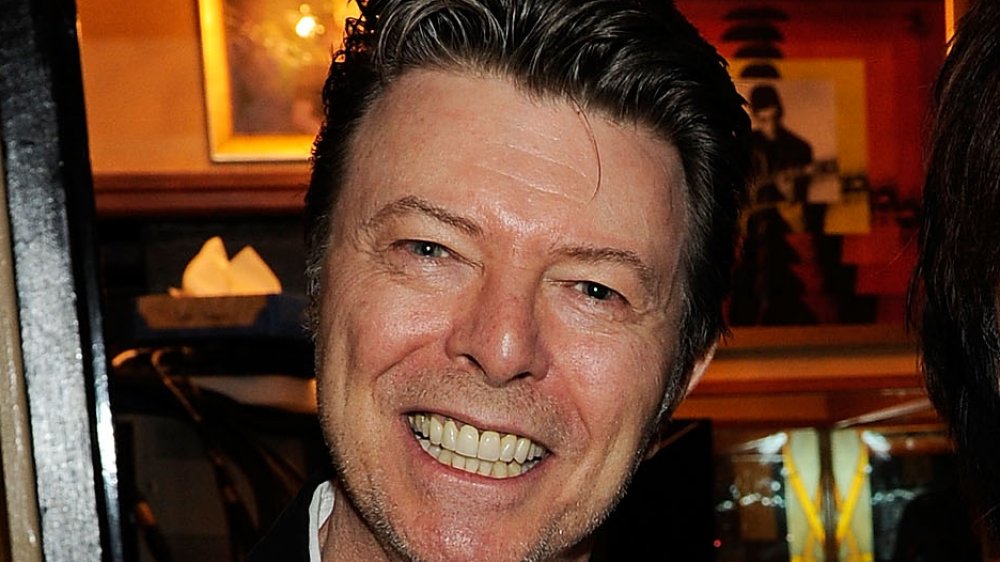What The Final 12 Months Of David Bowie's Life Were Like
David Bowie died from cancer on January 10, 2016, leaving behind one of the most eclectic catalogs in music history. He'd been a glam-rock star, an arty experimentalist, a dance-pop hit-maker — any genre was within his grasp, often because he was reinventing each one of them in his own malleable image. The whole world seemed to be in collective mourning after the singer's sudden, private death at age 69 — not only for the man himself, but also for the unrecorded, innovative albums we all assumed we'd be dissecting and debating in his twilight years.
But just as we continue to marvel about David Bowie's life, we can do the same with his passing. The final year of his existence was likely full of physical and emotional pain, but the songwriter filled every possible second with creativity, fueled by a rare drive to leave the planet with as rich a resume as possible. Let's take a look at what the last 12 months of David Bowie's life were like.
David Bowie battled cancer for months
According to a statement on David Bowie's official Facebook page announcing his death, the musician had been quietly battling cancer for 18 months. This means his health struggle began somewhere in mid-2014, though almost no one outside his close group of friends and collaborators even knew he was sick.
Then again, much about Bowie's life was secret by that point. He'd largely stepped out of the public eye after the tour behind his 2003 LP, Reality, which was cut short after a blocked artery forced him into emergency heart surgery, per the Guardian. "Three-quarters through the Reality tour, he said, 'You know, Mike, after this tour, I'm just going to be a father and live a normal life,'" keyboardist Mike Garson told Rolling Stone in 2016. "And I'm going to be there for [daughter] Lexi while she grows up. I missed it the first time.'"
David Bowie stuck true to his word, never embarking on another tour or sitting down for a major interview. It took him a full decade to record another album, 2013's The Next Day, and the recording sessions were shrouded in secrecy — partly because, according to the Guardian, he made his musicians sign non-disclosure agreements. That LP helped reinvigorate Bowie's art, and while fans were thrilled to have him back, his cancer was already plotting against him.
David Bowie finally created a musical
After The Next Day, the floodgates suddenly opened, with David Bowie tackling a number of lofty projects. As Rolling Stone notes, he had dreamed of writing a musical as a teenager, and he was able to fulfill that goal with Lazarus, a theatrical production based on Walter Tevis' 1963 science-fiction novel, The Man Who Fell to Earth. (Bowie starred in Nicolas Roeg's 1976 film adaptation as Thomas Newton, an alcoholic millionaire alien sequestered in his apartment and eager to return home.)
The production, which ran Off-Broadway from December 2015 through January 2016, was crafted around music from Bowie's discography, including classics like "Heroes," "Life on Mars?", "Changes," and "The Man Who Sold the World." More crucially, it also featured a quartet of newly written songs: the title track, "No Plan," "Killing a Little Time" and "When I Met You."
In this same period, David Bowie did technically embark on one final tour — just not in the flesh. David Bowie Is, a touring museum exhibition featuring artifacts from his life, ran from March 2013 to July 2018. "The deal was that we could borrow anything from the archive, but that he would have nothing to do with the exhibition; that all the text must be checked for factual accuracy by the archivist, but the interpretation is ours," co-curator Geoffrey Marsh told the New York Times.
David Bowie remained active by promoting his back catalog
Though David Bowie was mostly focused on creating new music during his final year, he also — like most rock stars with decades of material in the can — kept the catalog machine churning. His chart-topping 1983 hit "Let's Dance" was reissued on limited-edition yellow vinyl in July 2015 to coincide with the Australian leg of the David Bowie Is exhibition. And more famously, in September of that year, he released Five Years (1969-1973), a 12-CD or 13-LP box set compiling early albums David Bowie, The Man Who Sold the World, Hunky Dory, The Rise and Fall of Ziggy Stardust and the Spiders From Mars, Aladdin Sane and Pin Ups, among others.
Another noteworthy anecdote: Although Bowie was too busy to write an original song, he did offer up his obscure 1995 track "No Control" to be adapted for the 2016 Broadway musical adaptation of Nickelodeon's SpongeBob Squarepants. His tune was among high-profile company, including songs from the Flaming Lips, Panic! at the Disco, T.I., John Legend and Sara Bareilles.
The first sample of David Bowie's final album arrived in November 2015
David Bowie had re-entered the recording studio by January 2015 to start work on another studio album, but fans wouldn't hear the results for another year. However, the singer did unveil one new song, "Blackstar," in a rather unconventional way, allowing it to be used as the intro tune for The Last Panthers, a crime-drama created by British TV veteran Jack Thorne. (Talk about a promotional boost!)
An eerie wash of electronic art-jazz, "Blackstar" signaled yet another path forward in the career of an artist who rarely recycled ideas. The smoldering saxophone lines, jagged drum patterns and quivering vocal vibrato sounded unlike anything else he'd ever recorded, and the full version released months later only added to the track's grandeur. At just under 10 minutes, it became the longest song to ever reach the Billboard Hot 100 chart, according to Billboard (via Blabbermouth). But the record only lasted until 2019, when prog-metal band Tool claimed the title with their song "Fear Inoculum."
David Bowie was eager to build on his momentum
Surprise was an essential element of each David Bowie release — you never knew what his next record (or even next track) would sound like. But for Blackstar, which wound up being his final studio project, he really blew open the doors, weaving modern R&B, electronica and hip-hop into his sonic stew.
According to Rolling Stone, he and producer Tony Visconti were inspired by D'Angelo's 2014 soul-funk opus, Black Messiah, and Kendrick Lamar's experimental 2015 rap masterpiece, To Pimp a Butterfly. But the key element was jazz. During the good-natured sessions at New York City studios the Magic Shop and Human Worldwide, Bowie recruited the services of a wide crew of well-traveled jazz players, including woodwind player Donny McCaslin, keyboardist Jason Lindner, guitarist Ben Monder, and drummer Mark Guiliana. They defined the album's dense, sprawling arrangements — including the revitalized new versions of previously issued cuts "Sue (Or in a Season of Crime)" and "'Tis a Pity She Was a Whore."
"Surprise" was also crucial in another sense: Just like with The Next Day, David Bowie managed to keep these sessions secret, making the final product feel even more like a gift dropped from the heavens.
He was incredibly productive during his final studio sessions
The Blackstar sessions resulted in a pile of material: Along with the two old songs he polished up, David Bowie recorded five more tunes for the final tracklist ("Blackstar," eventual single "Lazarus," "Girl Loves Me," "Dollar Days," and hypnotic closer "I Can't Give Everything Away"), the three other songs used for Lazarus and, according to Rolling Stone's detailed report, five "strong outtakes" that wound up on the cutting room floor. Producer Tony Visconti described one, "When Things Go Bad," as channeling the spirit of Bowie's acclaimed 1971 LP, Hunky Dory.
Those tracks were reportedly being eyed for a deluxe edition of Blackstar, though no such project has materialized as of this writing. Given the high bar of quality Bowie had established around this time, we can only assume they're strong enough to see the light of day eventually. And since several David Bowie box sets have been issued in recent years, one can only hope there'll be room in the marketplace for a leftovers collection.
Cancer spread through David Bowie's body by late 2015
David Bowie continued his private cancer battle throughout his final studio sessions, sharing the diagnosis with only those closest to him. In a candid interview with Mojo, Tony Visconti recalled how Bowie revealed his diagnosis before they started Blackstar: "David said, 'I have something to show you,' and he pulled his woolly hat off and he was completely bald," he noted. "And he said, 'I have cancer' -– and my life hasn't been the same since that moment."
There were signs of optimism for David Bowie's health, as he briefly entered a period of remission in mid-2015. But despite the positive signs, the cancer continued to spread and became terminal. According to the Guardian, citing the documentary David Bowie: The Last Five Years, he learned while filming his final music video, for "Lazarus," that his treatment was going to stop. That same film also squashed the widely floated interpretation that the video — which features Bowie singing the lyric "Look up here, I'm in heaven" from a hospital bed — is a cryptic nod to his eventual fate.
The clip's director, Johan Renck, noted that he conceptualized the visuals a week before David Bowie learned his diagnosis. "To me it had to do with the biblical aspect of it," he says in the documentary. 'It had nothing to do with him being ill."
David Bowie's final public appearance
He beamed a charming smile as he exited a limousine and entered the New York Theatre Workshop in early December 2015, as photographers rapidly snapped images and fans called out with delight. David Bowie was on-hand for the premiere of Lazarus, a project he'd worked hard to realize throughout the year — and based on the footage and photos from that evening, you'd hardly be aware of his cancer battle.
But the show's director, Ivo van Hove, seemed to imply to the British tabloid the Mirror that he was putting on a brave face for the public. "It was written that he looked so well, so healthy," he said. "But behind the podium he collapsed from exhaustion. It was then that I [realized] that it may be the last time I would see him."
That David Bowie even bothered showing up to the premiere underscores his pride in the production and his quest to stay engaged with the arts, even as his disease progressed and the clock ticked on.
He was active up until the very end
It's mind-boggling to think that a musician of Bowie's stature, living out his final days with the knowledge of his fate, already sitting on a full finished album and a recently premiered musical, wasn't even finished in his own mind. According to Rolling Stone, in the final weeks before his death, Bowie somehow mustered up the strength to record five new demos — with ultimate plans of tracking an entire new LP. He reportedly rang up Visconti via FaceTime and detailed his plan, which "thrilled" the producer.
"I thought, and he must have thought, that he'd have a few months, at least," Visconti told the publication. "So the end must've been very rapid. I'm not privy to it. I don't know exactly, but he must've taken ill very quickly after that phone call."
David Bowie was also reportedly making other musical plans. Guitarist-producer Reeves Gabrels, who participated in a reimagined version of Bowie's 1987 LP, Never Let Me Down, told Guitar Player, "According to everyone involved in the Bowie estate trust, when David knew that he was dying, he left a five-year plan behind of what he wanted done with his music." Several years on, it's still unclear how much of that plan came to fruition.
David Bowie died just after the release of his 25th studio LP
In one of the most staggering creative moves in music history, David Bowie weaved his own death into the fabric of his art. Blackstar, his 25th and final studio album, was released on January 8, 2016 — and the press piled on with glowing reviews, completely unaware of his condition. Two days later, he passed away, and suddenly the record's themes — and its very existence — took on an unexpected depth.
References to death sprinkled throughout the songs couldn't help but feel prophetic in this new light. "Something happened on the day he died / Spirit rose a metre then stepped aside / Somebody else took his place and bravely cried," he sings on the title track. We can't know exactly what was swimming through Bowie's head during the Blackstar sessions, but mortality seems to have loomed large. And it's hard not to imagine David Bowie, a man who helped revolutionize the album as an artistic platform, thinking of the record as a parting gift to those who cherished his work.
"He never left us in spirit," producer Visconti wrote in a poignant Facebook tribute, speaking for fans everywhere. "We are fortunate to have lived in the same time as him. We've seen him, we've heard him sing and speak, we've hugged him, we've worshipped him and we are constantly reminded of him daily. ... He will be a legend until the end of time."
